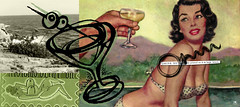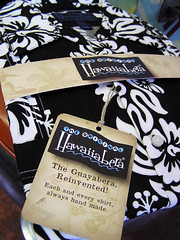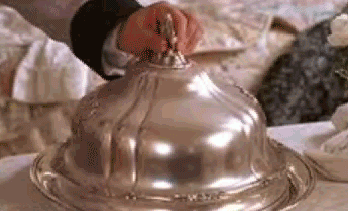Gigantic Steps
It took money troubles to get the celebrated Pixies back together. But no one could have predicted the large and passionate crowds that have greeted the band on its first tour in more than a decade.
It began, like so many life changes, with a joke. Singer, songwriter, and guitarist Frank Black, a.k.a. Black Francis, born Charles Michael Kittredge Thompson IV, was asked by a radio host if there was any chance his former band, the Pixies, would ever play together again. It was the summer of 2003, and Black – newly divorced, homeless, crossing Europe in a rental car trying to stretch a two-week solo promotional tour into six for lack of anything better to do – made a crack, inspired by a stunt George Harrison used to pull on journalists.
He announced on the radio that the foursome regularly gathered at his house for impromptu jams.
Within hours the Internet was flooded with rumors of a Pixies reunion. The next day Page Six of the New York Post printed an item about the Pixies' secret sessions. Industry insiders began phoning band members to ask if the stories were true.
“I was like, 'Oh, well. OK. Maybe we should,' ” says Black, chatting recently in the lobby of the W Hotel in Chicago, where the Pixies were in the middle of a five-night run at the Aragon Ballroom that sold out in one day. “Maybe that ridiculous joke, and everybody knew it was ridiculous, was a way to get my feet wet with the idea.”
The idea required no small amount of getting used to. For those unversed in alternative rock lore, a brief history: The Pixies formed in 1986 in Boston when UMass-Amherst dropouts Charles Thompson and Joey Santiago placed a now-legendary ad in the Boston Phoenix soliciting a bass player in. uenced by Husker Du and Peter, Paul, & Mary.
That turned out to be Kim Deal, who recruited her friend David Lovering, a drummer and electronic engineering student at the Wentworth Institute of Technology. Six years and five records later, in one very quiet, very hostile gesture, the Pixies imploded via Black's fax machine.
In between they changed the sound of rock music.
''Reagan was president. Somebody like Michael Jackson was number one. Everyone in Boston, including me, was playing jangly pop," says Gary Smith, owner of Fort Apache studios. Smith attended one of the Pixies' first live shows, at the Rat in Kendall Square, and soon after produced ''Come On Pilgrim," the Pixies' debut EP, released in 1987.
''Here was this kid screaming at the top of his lungs, then bringing it down to something very calm. There was something almost shamanistic about him. It was totally new, and I thought they were it."
So did Kurt Cobain, who routinely claimed that the loud-soft dynamics of Nirvana's breakthrough hit ''Smells Like Teen Spirit" was a blatant Pixies rip-off. Radiohead's Thom Yorke, another grateful fan, agreed to headline last spring's Coachella Festival, he said, because the Pixies would be there.
The band's cryptic, artful mash of pop hooks and jagged noise never broke through to the mainstream, at least not in the United States. It took five years for the group's most successful album, 1989's ''Doolittle," to go gold.
But hindsight confirms that the Pixies, who perform on Tuesday at the Mullins Center in Amherst and the following two nights at the Tsongas Arena in Lowell, were creating a sonic blueprint for the alt-rock explosion that followed. And the rapturous affection with which the Pixies reunion is being greeted -- audiences in many cities are 10 times bigger than they were the first time around, and they're overflowing with a new generation of fans -- is testament to the interest and regard that's grown steadily in the band's absence.
''In every group of friends there's one guy who's cool about music, who's the font of knowledge, and Pixies are one of the bands he talks about," explains Steve Albini, the indie-rock studio guru who produced the Pixies' 1988 full-length debut, ''Surfer Rosa."
''It's a kind of received wisdom, and you tell your friends when you go off to college, and leave your records to your little brother and sister. That's how they developed a momentum and enthusiasm among a fan base who'd never seen them and weren't even conscious of them the first time around."
And yet the Pixies' story is more convoluted than a simple case of a seminal act finally getting its due. It's a modern fable with a happy middle that fuses rock 'n' roll mythology with the far-less-glamorous reality of adulthood.
Older, wiser, and on a crash course with middle age, all four members of the band, who are in their late 30s and early 40s, unabashedly acknowledge (this band is nothing if not unabashed) the financial lure -- especially as the offers ballooned with every passing concert season.
Still, despite interest from record companies who want to put out a new Pixies album, there are no plans beyond this tour.
''There's a lot of potential for this to go wrong if we continue," Black admits.
Harmonious orbit at the Aragon Ballroom, where Spanish pillars and spilled beer combine to create this city's premiere concert ambience, the only plans for the future involve tonight's concert.
Santiago, who gets nervous before shows, is enjoying an impromptu massage from the production designer's wife.
Black (looking very much the expectant father he is in a button-down shirt and Brooks Brothers sweater vest) and Deal (who proudly displays a set of pillowcases she's embroidering for her twin sister, Kelley) sing scales in the stairwell.
Lovering, who's made his living as a professional magician for the past six years, kicks back on the sofa with a new deck of playing cards.
The musicians move in a detached but harmonious orbit. They hardly ever hang out. Neither do they butt heads. The chemistry is almost exclusively musical.
As the tour manager hands out set lists and fruit platters sit embalmed in plastic, a documentary film crew -- which recently recruited Kelley Deal for her unparalleled access -- pans the calm scene, hoping to capture a defining moment.
What the filmmakers get is one more dressing room nondrama. Seven months in, the Pixies' 2004 US tour is not only an unqualified success in the foundering touring industry, it's a model of gentility, a testament to family values, and, most critically, gainful employment.
''Why not be honest? It started to get pretty crappy for me, being freelance in LA," says Santiago, who grew up in Longmeadow and formed a band, the Martinis, with his wife, Linda Mallari, following the Pixies' split. Santiago has spent the last few years trying to break into film and TV composing; Mallari recently gave birth to the couple's second child.
''This tour has its perks for college funds," Santiago says. ''I can breathe."
Likewise for Lovering, a Burlington native who hung up his drumsticks to pursue magic full-time. He says he ''jumped into the air" when he got the call from Santiago, a North Hollywood neighbor with whom he'd remained close.
''I was in one of the worst times of my life," says Lovering. ''The timing couldn't have been better. If you think being a musician is tough. . . . This was like a lost love coming back."
There was never any love to lose between Black and Deal, whose strained relationship was at the root of the Pixies' split. Creative conflicts, ego entanglements, and tight quarters (this time around Deal has forsaken the tour bus for her own RV) were exacerbated by plenty of booze and drugs.
By the end of the Pixies' final tour, opening for U2, Thompson and Deal weren't speaking. Of the fax he sent to the band's manager on New Year's Day 1992, Black explains, ''It was very brief, very nonemotional. It said something like 'I leave.' I did it in a very evasive, super-nonconfrontational way and it probably could have been perceived as a little cold."
Black went on to release a string of modest-selling records with his band the Catholics. Deal has stayed busy if not exactly flush with the Breeders, the quirky rock band she formed in 1989 as a creative outlet outside of the Pixies. The two had no contact for the next 11 years.
Back with Black
When Deal, who lives in her hometown of Dayton, Ohio, received the heads up from Santiago, ''I was mystified," she says over coffee in her hotel room. ''But Joe said it was important to him, a life-changing thing for him. So I said I'd do it.
''I called Charles and said, 'I heard we might be getting the gang back together.' And he said, 'Yeah.' And I said, 'The first thing we'll do is get in a room and practice and if it feels stupid we'll say, ''OK. We tried." ' "
Deal smiles beatifically throughout the entire set at the Aragon, even when she's singing. Her signature bizarre duets with Black -- he screams, she coos -- reach a ghostly peak on ''Debaser," one of the Pixies' most gleefully demented singles, where Black fumes mightily and Deal just throws her head back and glows.
At her request, the Pixies tour is dry, and everyone agrees that a little sobriety goes a long way toward keeping both the peace and the music intact.
And it's impossible to overestimate the restorative benefits that come with the simple passing of time.
''If you want to enjoy it and do a good job you have to kind of grow up," says Black. ''Ms. Deal and I had one little heartfelt conversation in her car and another out by the railroad tracks behind the rehearsal space. You start to use your imagination and fill in the blanks when there are a lot of blanks, and I think both assumed that the other one was angrier than we really were.
''We had to bury a little hatchet," he says, pinching his finger and thumb together. ''About this big."
Black recently relocated from LA to Eugene, Ore., to live with his girlfriend, an art history graduate student, and her two young children. These days his life revolves around ballet-class carpool and bedtime enforcement. Surging crowds of young fans may revel in the second coming of Kurt Cobain's teachers. But from his vantage point, with a baby on the way, Black's take on the Pixies reunion is remarkably uncluttered.
''We've had this chip in our back pocket for a long time, and it keeps going up in value," Black explains. ''We're cashing it in this year."
Thanks to Joan Anderman at The Boston Globe: anderman@globe.com


















